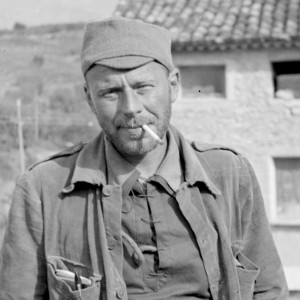Waiting, by Alvah C. Bessie

Alvah Bessie (Tamiment Library, NYU, 15th IB Photo Collection, Photo # 11-0176)
The Volunteer for Liberty, V. 2, No. 31, September 5, 1938
We moved down off the hill in single file, the taste of breakfast still in our mouths –coffee, chocolate, ham and sardines, bread, marmalade and plums. There was a comfortable weight inside us., and there was, too, the inevitable nervousness, the pre-action tension that heightens the senses and makes a man take notice of things he never noticed before… a lizard sticking his head out of a crack in the dry, volcanic rock, a broken shoelace, a streak of dirt on another man’s face. There was to be a mass attack on X…; it was to stat early in the morning; two divisions were moving through parallel barrancos toward the town.
The barranco was narrow at the top, wide at the bottom. Ahead of us our 59th Battalion had engaged the enemy; they were out of sight ahead of us, but the machine guns were singing their crisp, metallic song. The rifle bullets snapped over our heads as we waited, flattened on the dry earth, seeking cover below the terraces behind the olive trees. You could look around and see men flattening visibly into the ground, disappearing, their rifles canted against the natural parapets ahead. A runner would appear from below, dash from tree to tree, to reappear later, sweating. The sun rose straight above us, hanging heavy over our heads, beating on our backs and heads. There was no water as we waited for the word to go ahead, wondering how long it would be before the word came, what would happen when it came, how much opposition we would meet at the mouth of the barranco as we emerged. You could hear our Hotchkiss talking from the hill on our left; a heavy Maxim on the right. There was avion overhead, seeking – finding? We waited for it to find us; we watched its impersonal evolutions overhead, bank and turn, soar and glide, looking for something it should find in the course of time. We watched the stretchers coming back.
It is possible to watch the stretchers coming back in an entirely impersonal fashion. You note the severity of the wound; you try to catch a glimpse of the face; you think “There I go, back to the hospital” and you think “Does it hurt much?” One by one the stretchers came back from the line, weaving between the twisted olive trunks, moving back up the slope of the barranco, the camilleros backs exposed to the enemy fire. You could not envy them their jobs, their lives dependent on and weighted with the weight and the life of the comrades they were carrying. You watched them thinking “There I go” or “Will it be bad?” You wondered how things were going ahead and how soon the word would come, and you wondered where our artillery was, and how soon it would open up, and where was the promised avion. You listened for it.
You woke with astonishment to find that you had been dozing in the sun; the heat and the dust had combined to undo your senses and relax your vigilance, and the body snatched at the rest it needed, the rest it had forgone during the hard days of action that had gone before. You woke with a start wondering how you could have possibly gone to sleep in the face of the fire –you felt a sickening sensation at what you had done, like a man who has come safely through an accident and then suddenly recalls how close he had been to death and feels his guts turn over in his body. Vigilance returns and with it the heightened sensibility, the tension. Someone is eating a tin of sardines nearby; you can smell the warm olive oil.
All day, in the stifling heat and the thirst we waited, the sun pounding our backs, the hammering song of the Hotchkiss loud from the left slope of the barranco. “The damned fool” we thought, “Can’t he shut up for a while? He’ll ruin the bore, he’ll give his position away!” Dusk brought the order to advance –and it brought other things as well. The unbearable tension snapped; the parched lips were wet with the moist tongue. Over the right slope of the barranco, there came sailing, precisely spaced and beautifully colored in the failing light, tracer bullets like small balls of pink fire. They soared across the valley into the Hotchkiss position, but the gun continued to fire. From behind us the enemy artillery awoke, and the shells came over –you could count them as they came. And then you couldn’t count them; they fell in no regular order, but with an almost conscious knowledge of where we were –to left, to right, ahead, behind, crashing like enormous garbage cans heaved by gigantic men. The broken earth fell on us, the cracked rock spattered against the unbroken stone of the hillsides. We were moving forward, and the deepening night was loud in our ears.












